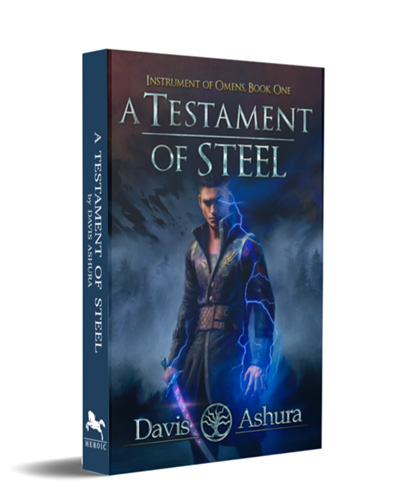Arts
A fast-paced fantasy closer to home
There was always something about Tolkien, Rowling, and Pullman that I just couldn’t reckon with – fantasy fiction was never my thing. But that changed in early July when I was tasked with reading the newly released epic fantasy, ‘A Testament of Steel’, and interviewing its author, Davis Ashura. He described the book as, “a hero’s journey… it starts with a young man who – through a lot of hard work, sheer determination, and luck – becomes somebody worthy of the main hero. But there’s something within his heart that teaches him that what he really wants is for others to have good lives too.” I found myself slowly getting pulled in and reader, I was shook!

Davis Ashura
Zoom-ing from the United States, Ashura is a doctor/ writer of Indian descent whose self-published series – ‘The Castes and the OutCastes’ and ‘The Chronicles of William Wilde’ – have made him successful in the fantasy fiction genre. “I’ve always wanted to be a writer since I was 14 years old but things like college, medical school, residency, etc.sort of got in the way. Then in 2008, my wife found a writing course that a local college was having and she said, ‘Do you want to take this? You’ve always wanted to write.’ I ended up doing it.” I quip that perhaps the moral of the story is to always listen to your wife. He replied, “Yeah that’s usually the best moral of the story!”
With the exception of his audiobooks which are published by Audible Studios, this is the first time one of his novels has been picked up by an independent publisher (Heroic Books). Describing it as a story that had been percolating in his mind for some time, ‘A Testament of Steel’ (which will be the first of a 7-part series) centres on Cinder Shade who is born with a clubfoot and withered leg in the sleepy village of Swallow. Following the murder of his parents he is sent to Swift Sword where he develops the skills of a warrior that take him on adventures and immerse him into experiences that shape his moral and ethical outlook. “I wanted to make a point that people who are born in one aspect of life shouldn’t feel limited – they should rise above wherever they stand and reach for glory.”
I try to figure out why the novel gripped me as much as it did and I think it partially comes down to his style of writing, the fast-paced plot, and how detailed and visceral his fight scenes feel. Of this he says, “I used to watch UFC all the time when it came out and eventually you pick up the language, how they’re moving, what they’re trying to do and then you incorporate that and hope it’s good enough to overcome disbelief!” In addition, I was in awe of the mythical realm he was able to create from scratch and the sheer scope of it, which he says was inspired by Robert Jordan’s ‘Wheel of Time’ as well as Tolkien’s ‘Lord of the Rings’.
But it mainly has to do with the fact that the world depicted in the novel is very reflective of the one I’m familiar with. Most of the characters are people of colour, some of the customs are recognisable, and Ashura even incorporates Hindu elements like Jivatma (the soul being a reflection of God’s glory) in tribute to his parents and his background. There seems to be an extreme lack of diversity within the fantasy genre and its television/film counterparts; dragons aplenty but hardly any people of colour.However, Ashura is swift to point out that this isn’t entirely true, given the successful legacy of stories like Arabian Nights and Ramayana. In fact, he says the landscape has changed whereby these days, traditional publishers are actually seeking out non-traditional stories set in worlds that aren’t based on medieval Europe. “Those stories are there but nobody outside of those cultures knows about them and so I think publishers recognise there’s a large hunger for stories set outside of the white norm. Being Indian I absolutely wanted to write about people that looked like me and had a history similar to my own in terms of the culture.”
It feels then like ‘A Testament of Steel’ has come at exactly the right time, not just because it’s a soothing balm for the times we’re in but also because it’s long overdue in an industry that hasn’t always prioritised the Other’s stories. As this old world slowly disintegrates and a new one emerges, we’re hoping the future will be brighter…and maybe a little bit more magical.
‘A Testament of Steel’ is out now and the audiobook will be available in September.


